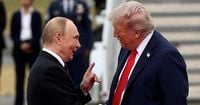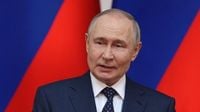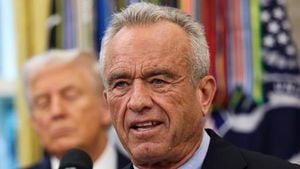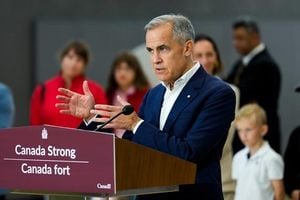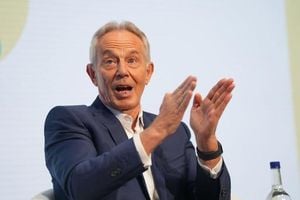Two months after the much-anticipated summit between U.S. President Donald Trump and Russian President Vladimir Putin in Anchorage, Alaska, the diplomatic landscape between Washington and Moscow remains fraught with tension, competing signals, and high-stakes maneuvering. What began as a moment of cautious optimism now teeters between hope and disappointment, as both leaders attempt to navigate the complex realities of the war in Ukraine, arms control, and their own shifting political interests.
The August 15, 2025, summit marked the first face-to-face meeting between Trump and Putin in six years and Putin’s first visit to U.S. soil in a decade, according to Reuters. The two leaders discussed a broad agenda: the future of Ukraine, strategic arms reduction, and the potential for a new era of U.S.-Russia cooperation. Yet, despite the pageantry and initial pledges, the path forward is anything but clear.
On October 10, Putin addressed reporters in Tajikistan, reaffirming that Russia remains committed to the agreements reached in Alaska. "We remain committed to the discussion that took place in Anchorage. We are not changing anything for ourselves here – we believe that some further work is still needed on both sides. But overall, we remain committed to the Alaska agreements," Putin emphasized, as reported by Report. He described the Ukraine settlement as a "complex issue that requires further consideration," and noted that both he and Trump agreed to consult with their respective governments and allies before any final decisions are made.
Putin’s optimism, however, is not universally shared within his own administration. Russian Deputy Foreign Minister Sergei Ryabkov painted a far gloomier picture, telling Reuters this week that the "powerful momentum" of the Alaska summit has been lost. He likened U.S.-Russia relations to a "collapsing house," warning, "Now the cracks have reached the foundation." Ryabkov’s remarks underscore the fragility of any progress and the deep mistrust still lingering between the two powers.
The war in Ukraine remains the central sticking point. While Putin insists that both sides have an understanding of how to pursue a peaceful resolution, Trump’s recent rhetoric has raised eyebrows in Moscow. The U.S. president has floated the idea that Ukraine could regain all its lost territories, a stark departure from earlier, more conciliatory tones. Trump has also suggested he is considering supplying Kyiv with long-range Tomahawk cruise missiles, a move that would dramatically escalate Ukraine’s ability to strike deep into Russian territory.
Putin was quick to dismiss talk of Tomahawk transfers as little more than posturing. "This is also a kind of bluff. There's an element of showing off here," he said, according to The Kyiv Independent. Yet beneath the bravado, Moscow has issued stern warnings. The Russian leader cautioned that any U.S. delivery of Tomahawks would "seriously undermine" the remnants of U.S.-Russia relations and risk destabilizing ongoing peace efforts. Russian military officials have gone further, threatening to shoot down any such missiles and retaliate against U.S. interests if provoked.
Ukrainian President Volodymyr Zelensky, for his part, has welcomed the possibility of receiving advanced U.S. weaponry. On October 8, Zelensky told reporters that such missiles could "force the Russians to sober up and sit down at the negotiating table," adding that Trump had not ruled out the transfer during their recent meeting at the United Nations General Assembly. With a range of up to 2,500 kilometers, the Tomahawk would represent a significant escalation in Ukraine’s military capabilities—and a new stage in the conflict, as Moscow has repeatedly warned.
Amid the uncertainty, both sides have dangled the prospect of renewed arms control. Putin has offered to voluntarily maintain limits on deployed strategic nuclear weapons, as set out in the last remaining arms control treaty with the U.S., if Washington does the same. Trump responded positively in public, saying "it sounds like a good idea," but there has been no formal U.S. response, and the broader arms control framework remains at risk of unraveling.
The diplomatic dance has played out alongside dramatic developments elsewhere. On October 10, Venezuelan opposition leader Maria Corina Machado was awarded the 2025 Nobel Peace Prize for her advocacy of democratic rights. The decision sparked sharp criticism from the White House, which accused the Nobel Committee of placing politics above peace by overlooking Trump’s recent diplomatic achievements. White House spokesperson Steven Cheung insisted, "President Trump will continue making peace deals, ending wars, and saving lives. He has the heart of a humanitarian, and there will never be anyone like him who can move mountains with the sheer force of his will." Trump himself expressed frustration, citing his efforts to broker a ceasefire in Gaza and end "eight wars," while lamenting that his predecessor Barack Obama had received the prize "for doing nothing."
Putin, for his part, offered rare praise for his American counterpart, telling Reuters that Trump "does a lot for peace," and pointing to the recent ceasefire between Israel and Hamas as a testament to Trump’s diplomatic influence. "If it succeeds, it would represent a truly historic achievement," Putin said, referring to Trump’s 20-point Gaza peace initiative, which led to a ceasefire coming into effect on October 10. Israeli Prime Minister Benjamin Netanyahu went even further, declaring publicly, "The Nobel Committee talks about peace. President @realDonaldTrump makes it happen. The facts speak for themselves. President #Trump deserves it." Pakistani leaders also joined the chorus, advocating for Trump to receive the Nobel Peace Prize.
Back on the U.S.-Russia front, the lack of concrete progress is palpable. There is no new Trump-Putin meeting on the horizon, and the U.S. has not appointed a new ambassador to Moscow since June 2025. A Kremlin aide told Kommersant that Russia had agreed to unspecified concessions at the Alaska summit, but only if Trump could deliver certain outcomes from Ukraine and Europe—a conditionality that now seems increasingly unlikely to be met.
Still, efforts at dialogue continue, sometimes in unexpected ways. Melania Trump announced that she had established an open line of communication with Putin regarding the repatriation of Ukrainian children caught up in the war, and that some had already been reunited with their families. Putin, meanwhile, has sought to appeal to U.S. political factions, praising Michael Gloss, the son of a CIA official killed fighting for Russia in Ukraine, as embodying "the core of the MAGA movement, which supports President Trump," and condemning the murder of Trump ally Charlie Kirk as a blow to "traditional values."
Yet, as the diplomatic back-and-forth continues, the fundamental issues remain unresolved. The war in Ukraine grinds on, arms control teeters on the brink, and the promise of a new era in U.S.-Russia relations seems as elusive as ever. Whether the spirit of Anchorage can be rekindled—or whether it was always just a fleeting illusion—remains to be seen.
For now, the world watches as two leaders, each with their own ambitions and constraints, circle one another in a high-stakes game with consequences far beyond their own borders.
